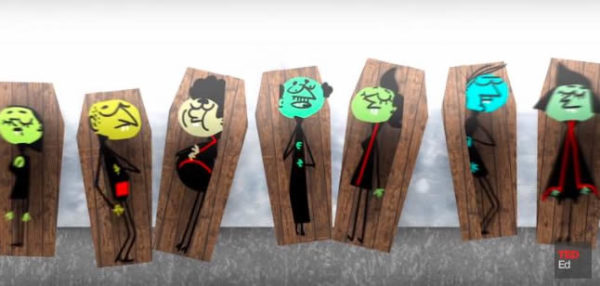Winter break is over, spring break is hovering somewhere just out of sight, and most students and teachers sigh as they count down to June and the start summer vacation. If your classroom could just a little jolt of excitement, why not try TED-Ed Lessons?
The TED-Ed platform is especially cool because educators can build lessons around any TED-Ed Original, TED Talk, or YouTube video. Once you find the video you want to use, you can use the TED-Ed Lessons editor to add questions, discussion prompts, and additional resources.
Related content: 5 TED-Ed Lessons to introduce your students to robotics
Topics include health, religion and philosophy, STEM, literature, thinking and learning, and more. Check out these 5 TED-Ed Lessons, and explore the platform to find new lessons or create your own.
1. Inside the mind of a master procrastinator: Tim Urban knows that procrastination doesn’t make sense, but he’s never been able to shake his habit of waiting until the last minute to get things done. In this hilarious and insightful talk, Urban takes us on a journey through YouTube binges, Wikipedia rabbit holes and bouts of staring out the window— and encourages us to think harder about what we’re really procrastinating on, before we run out of time.
2. Why doesn’t the Leaning Tower of Pisa fall over? In 1990, the Italian government enlisted top engineers to stabilize Pisa’s famous Leaning Tower. There’d been many attempts during its 800 year history, but computer models revealed the urgency of their situation. The tower would topple if it reached an angle of 5.44 degrees— and it was currently leaning at 5.5. What gives the tower its infamous tilt? Alex Gendler explores the monument’s history.
3. The high-stakes race to make quantum computers work: Quantum computers could eventually outstrip the computational limits of classical computers. They rely on the behavior of atomic and subatomic particles, whose quantum states are incredibly fragile and easily destroyed— which is why this technology remains largely theoretical. How would quantum computers work, and are they really possible? Chiara Decaroli investigates.
4. Can you solve the vampire hunter riddle? You’ve stealthily descended into the darkness of a vampire cave, setting a sequence of mirrors as you go. When the sun reaches the right angle in the sky, a beam of light will ricochet along the mirrors, strike a diffuser, and illuminate the great chamber where the vampires sleep. Can you place the diffuser correctly and flood the lair with sunlight? Dan Finkel shows how.
5. Underwater farms vs. climate change: For billions of people, seafood provides a significant source of protein and nutrition, but over half the seafood we eat isn’t caught in the wild, it’s grown through aquaculture. Farmed seafood is one of the fastest-growing food industries, but the farming methods echo the problems we’ve seen in industrial agriculture. Is there a way to sustainably farm the ocean? Ayana Elizabeth Johnson and Megan Davis investigate.
- Friday 5: Virtual field trips - April 26, 2024
- Google, MIT RAISE launch no-cost AI training course for teachers - April 26, 2024
- 4 ways to support work-based learning - April 23, 2024


